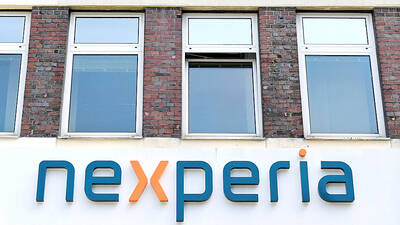CSBC Corp, Taiwan (台灣國際造船) shareholders at a extraordinary general meeting on Thursday approved the company’s plans to reduce its capitalization, aiming to offset accumulated losses.
The Kaohsiung-based shipbuilder is to cut its paid-in capital by 57.91 percent from NT$7.44 billion to NT$3.13 billion (US$248.3 million to US$104.4 million).
At the end of the last quarter of this year, the company had accumulated net losses of NT$4.81 billion, translating to a loss per share of NT$6.45.
Apart from a persisting downturn in the global cargo shipping sector that has driven down demand for new vessels, the company’s earnings this year have been affected by a strengthening New Taiwan dollar against the US dollar and rising material costs, CSBC said, adding that the company’s margins have also been narrowing as existing projects lag behind schedule.
To pave the way for the company’s diversification, shareholders also voted to remove a rule that has limited investments in non-shipbuilding and maintenance to less than 10 percent of its paid-in capital, the company said.
CSBC has said it is preparing to tap into the offshore wind farm market to reduce its reliance on shipbuilding.
Shareholders also approved plans to issue no more than 200 million new shares through a private placement to raise fresh funds.
The new shares would likely be purchased by government affiliates, such as Yao Hua Glass Co (耀華玻璃) and Taiwania Investment and Management Co Ltd (台杉投資管理), the company said.
In the July-to-September period, CSBC reported a net loss of NT$2.14 billion, marking its sixth consecutive quarter in the red.
Meanwhile, the number of shipbuilders across the globe has tumbled from 934 in 2009 to 358 at the end of July this year, of which an estimated 163 have no further orders, CSBC has said.
Looking ahead, the company said that earnings are expected to improve along with a recovery in the global cargo shipping sector.
CSBC said that the Baltic Dry Index — a gauge of freight rates for transported cargo such as coal, grain and iron ore — has recently risen above the 1,500-point benchmark to reach a new high for the past four years, although the index dropped this week as the market fell into consolidation mode.
In particular, the Asia Pacific region would see rapid growth as fleets in the region speed up their adoption of new vessels, the company said.
CSBC is also anticipating up to NT$500 billion in sales opportunities from upcoming procurements by the navy and coast guard that are expected to materialize next year, the company said.

Jensen Huang (黃仁勳), founder and CEO of US-based artificial intelligence chip designer Nvidia Corp and Taiwan Semiconductor Manufacturing Co (TSMC, 台積電) on Friday celebrated the first Nvidia Blackwell wafer produced on US soil. Huang visited TSMC’s advanced wafer fab in the US state of Arizona and joined the Taiwanese chipmaker’s executives to witness the efforts to “build the infrastructure that powers the world’s AI factories, right here in America,” Nvidia said in a statement. At the event, Huang joined Y.L. Wang (王英郎), vice president of operations at TSMC, in signing their names on the Blackwell wafer to

AI BOOST: Although Taiwan’s reliance on Chinese rare earth elements is limited, it could face indirect impacts from supply issues and price volatility, an economist said DBS Bank Ltd (星展銀行) has sharply raised its forecast for Taiwan’s economic growth this year to 5.6 percent, citing stronger-than-expected exports and investment linked to artificial intelligence (AI), as it said that the current momentum could peak soon. The acceleration of the global AI race has fueled a surge in Taiwan’s AI-related capital spending and exports of information and communications technology (ICT) products, which have been key drivers of growth this year. “We have revised our GDP forecast for Taiwan upward to 5.6 percent from 4 percent, an upgrade that mainly reflects stronger-than-expected AI-related exports and investment in the third

RARE EARTHS: The call between the US Treasury Secretary and his Chinese counterpart came as Washington sought to rally G7 partners in response to China’s export controls China and the US on Saturday agreed to conduct another round of trade negotiations in the coming week, as the world’s two biggest economies seek to avoid another damaging tit-for-tat tariff battle. Beijing last week announced sweeping controls on the critical rare earths industry, prompting US President Donald Trump to threaten 100 percent tariffs on imports from China in retaliation. Trump had also threatened to cancel his expected meeting with Chinese President Xi Jinping (習近平) in South Korea later this month on the sidelines of the APEC summit. In the latest indication of efforts to resolve their dispute, Chinese state media reported that

CHINESE EXPORT CURBS: A dispute between China and the Netherlands could halt chip supply, affecting vehicle production, US and European auto associations said Groups representing major automakers late on Thursday warned that a chip disruption stemming from a dispute between China and the Dutch government could quickly affect US auto production. Automakers and their suppliers received notice from chipmaker Nexperia (安世半導體) last week that it could no longer guarantee delivery of its chips, the European Automobile Manufacturers Association said, adding that manufacturing could be significantly disrupted. In the US, the Alliance for Automotive Innovation, which represents General Motors, Toyota, Ford, Volkswagen, Hyundai and nearly all other major automakers, urged a quick resolution. “If the shipment of automotive chips doesn’t resume — quickly — it’s going to